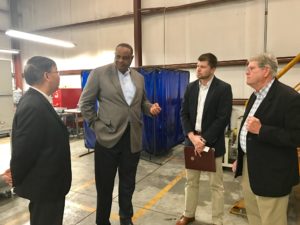 General Capacitor, LLC (GC) and its founder and Chief Scientist Dr. Jianping (Jim) Zheng led Representative Al Lawson on a tour of the Tallahassee facility and introduced him to some of the new research and products coming out of the local start-up company. Dr. Zheng, who is Professor of Electrical & Computer Engineering at the FAMU-FSU College of Engineering, also holds the patents licensed through GC from FSU on the intellectual property that is utilized by GC to produce a highly-advanced energy power system that is benefitting from both federal funding and private investment. Also along for the tour was Davis George Moye, Project Manager & Corporate Counsel of General Capacitor, Dr. Raymond Bye, consultant to General Capacitor, Sue Dick President/CEO of the Tallahassee Chamber and Jay Revell, Vice President of the Chamber. Dr. Zheng explained how GC’s new lithium ion supercapacitor (LIC) is able to safely replace lithium ion batteries (LIB) which have recently been at the center of fires and battery explosions.
General Capacitor, LLC (GC) and its founder and Chief Scientist Dr. Jianping (Jim) Zheng led Representative Al Lawson on a tour of the Tallahassee facility and introduced him to some of the new research and products coming out of the local start-up company. Dr. Zheng, who is Professor of Electrical & Computer Engineering at the FAMU-FSU College of Engineering, also holds the patents licensed through GC from FSU on the intellectual property that is utilized by GC to produce a highly-advanced energy power system that is benefitting from both federal funding and private investment. Also along for the tour was Davis George Moye, Project Manager & Corporate Counsel of General Capacitor, Dr. Raymond Bye, consultant to General Capacitor, Sue Dick President/CEO of the Tallahassee Chamber and Jay Revell, Vice President of the Chamber. Dr. Zheng explained how GC’s new lithium ion supercapacitor (LIC) is able to safely replace lithium ion batteries (LIB) which have recently been at the center of fires and battery explosions.
The Department of Defense (DoD) is a frequent user of lithium ion batteries in a number of their defense applications. Dr. Zheng’s new LIC was in the Army’s Rifleman radio which is utilized by every soldier. Prior to the use of Dr. Zheng’s LIC’s, the soldier’s radios were overheating within the first few minutes of usage because of its lithium ion battery. GC was able to replace the LIB with a new LIC, eliminating the over-heating issue completely and providing more power, almost immediate re-charging, and a lighter weight than the lithium ion battery counterpart. That GC capacitor is in its final field tests, but once completed, complete replacement of the LIBs with GC’s new LIC will be required in all 6,000,000 Rifleman radios used by the Army.
Dr. Zheng’s research and development work with the Army led the Army to request that he employ his expertise to develop a unique hybrid power system that would integrate the strengths of the LIBs and LICs into a single, internal hybrid system to replace the Army’s workhorse lead acid battery, e.g., the 6T lead-acid battery. When successfully developed and tested, this new hybrid power system will provide more power, a wider temperature range, longer operating usage, and a dramatically reduced weight. Initiating work on this new hybrid power system is just beginning based on a new $1.8M award received from the Army last month. There are potentially numerous commercial applications for this new hybrid including the replacement of 24 volt lead-acid batteries utilized in cars, trucks, and buses around the world.
Dr. Zheng explained to Representative Lawson that he has had discussions with the Army, Navy, and Air Force on a new multi-services initiative that calls for the development of an ultra- high density hybrid energy storage module which could have a multiplicity of usages for all of the military services. Such a new hybrid module could be employed on a number of different platforms (for example, in micro-grids for the Army; on ships for the Navy; and on aircraft and space-craft for the Air Force). The development of a new hybrid energy storage module would also provide the benefits of this new, unique system—lighter, more powerful, longer life, and with less weight and wider temperature ranges—to all the military services in these critical new and advanced technological areas. Representative Lawson was extremely impressed with the capabilities of the new technologies and offered his interest and support for continued research and development to bring more jobs to Tallahassee and Florida.
Submitted by Dr. Raymond Bye, Consultant to General Capacitor

